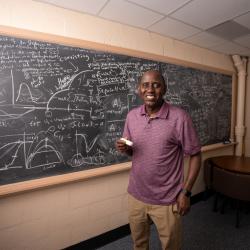Astronomy Ph.D. Student Awarded Prestigious NSF Postdoctoral Fellowship
UMD’s Rebecca Levy was selected for one of the National Science Foundation's Astronomy & Astrophysics Postdoctoral Fellowships this year
Rebecca Levy’s love for astronomy began at a very young age. She grew up watching TV shows with her dad about the stars and the universe on the Science Channel and Discovery Channel that always captured her attention.
“When I started watching these shows in middle school, I just loved learning all of the cool facts about the universe,” she said. “But as I got older, I became more interested in how the astronomers knew all of these facts.”
During one of these shows, a quick comment from her father set the stage for Levy’s future career path.
“We were watching a show and my dad noticed one of the experts and said, ‘Oh, that’s professor so-and-so. That could be you one day,’” she recalled. “At that moment, a lightbulb went off and I realized that studying the stars and galaxies could be something I could do for a living. Once I realized it could be my actual job, I never looked back.”
Now, Levy, an astronomy Ph.D. student set to graduate this summer from the University of Maryland, is well on her way to becoming an astronomy professor and making her dream a reality. This spring, she received a National Science Foundation (NSF) Astronomy and Astrophysics Postdoctoral Fellowship, which she will take to the University of Arizona this fall.
Levy’s fellowship will support her and her research for up to three years.
“The NSF Fellowship is an incredible opportunity and I’m very excited to continue with my research,” she said.
Levy’s research focuses on galaxies close to our own Milky Way galaxy and the effect star formation and explosions have on those galaxies.
“Stars are born out of clouds of gas that eventually start to collapse under gravity,” Levy explained. “When the gravitational pull of the collapse is especially strong, a star is formed and can release huge amounts of energy that destroy the rest of the cloud. Those same stars eventually run out of fuel, blow up and release even more energy into the galaxy.”
If a lot of stars form in one place, the energy that is expelled can have huge consequences on the rest of the galaxy and can alter the way it will evolve going forward. The goal of Levy’s research is to determine how this energy will affect the immediate environment within a galaxy and the galaxy as a whole.
“What I'm interested in studying is how we can trace the energy from the stars that are forming and the stars that are blowing up with observations of the gas itself,” she said.
Levy’s work will eventually help astronomers understand the effects stars have on galaxies as a whole. This understanding will also help inform computer simulations of galaxies for future studies.
In addition to the research, Levy’s fellowship also has a “broader impacts” component that requires her to use her research or resources to help the community.
“For some people, having to do an outreach program on top of your research may sound daunting, but I find it really exciting and I think it’s important to give back to your community. I consider it a huge plus of the program,” she said.
For her “broader impacts” component, Levy will adapt the NSF-funded Colors of Nature program—a program that uses STEAM (science, technology, engineering, art and math) education to develop middle-school students' identities as scientists.
Her goal is to make Colors of Nature a sustained after-school program for members of the Tohono O'odham Nation, the Native American reservation on whose land the Kitt Peak National Observatory is built. The University of Arizona operates telescopes on Kitt Peak that Levy plans to use in her research.
“Middle school is where we see some students’ interest in science begin to wane, and I want to help Tohono O’odham students build up their identities as scientists and see that it is applicable in their everyday lives,” she said.
Once she graduates this summer, Levy will head to Arizona and hit the ground running on all aspects of her NSF Fellowship.
“I’m looking forward to the independence in the research. I’m really excited about the projects I proposed and I’m ready to jump right in,” she said. “I’m also really excited about moving forward with the outreach program. I have a lot of enthusiasm about it and I’m ready to get going.”
###
Media Relations Contact: Chelsea Torres, 301-405-5204, cctorres@umd.edu
University of Maryland
College of Computer, Mathematical, and Natural Sciences
2300 Symons Hall
College Park, MD 20742
www.cmns.umd.edu
@UMDscience
About the College of Computer, Mathematical, and Natural Sciences
The College of Computer, Mathematical, and Natural Sciences at the University of Maryland educates more than 9,000 future scientific leaders in its undergraduate and graduate programs each year. The college's 10 departments and more than a dozen interdisciplinary research centers foster scientific discovery with annual sponsored research funding exceeding $200 million.








